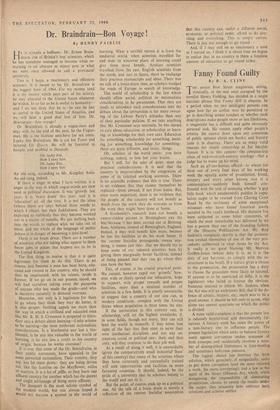Fanny Found Guilty
By R. A. CLINE
rr HE senior Bow Street magistrate, sitting, I ironically, in the seat once occupied by the novelist Henry Fielding, has decided in a single succinct phrase that Fanny Hill is obscene. In a period when no two intelligent persons can agree how far an author may be permitted to go in describing sexual conduct or whether such descriptions make people more or less libidinous, a magistrate has a difficult and quite obviously personal task. He cannot apply other people's criteria. He cannot draw upon any consensus of public opinion about sex books; and literary taste is in disarray. There are as many valid reasons for chaste censorship as for bacchic licence. It is in this context—the compass-less ethos of mid-twentieth-century sexology—that a judge has to make up his mind.
Such an all-too-human official—to whom for three out of every four days of his working week the squalid scene of prostitution, fraud, pimpery and every other known vice is a commonplace--suddenly finds himself con- fronted with the task of assessing whether 'a gay little book' which unashamedly peddles in copu- lation ought to be rescued from Charing Cross Road by the testimony of some exceptional witnesses who have found historical jewels secreted in the toad's forehead. His decision has been subjected to some bitter comments, of which the most remarkable was delivered by no less a person than one of the founding fathers of the Obscene Publications Act. Mr. Roy Jenkins's complaint shortly is that the prosecu- tion availed themselves of one of the very pro- cedures authorised in clear terms by the Act. It really is no good blaming Mr. Mervyn Griffith-Jones (whose duty it is, as it is the duty of any barrister, to comply with the in- structions in his brief). If a statute gives a choice to the prosecution, the prosecution has a duty to choose the procedure most likely to succeed. If anyone is to be convicted of folly, it is the legislators who failed to foresee the obvious. Someone omitted to inform Mr. Jenkins, when the Act was still an embryonic Bill, that if the de- fence of artistic, historic, etc., merit was to be a good answer, it should be left only to juries, who alone can answer questions on which the public is divided.
A more valid complaint is that the present law is odiously hypocritical and demonstrably fal- lacious. A literary work has twice the power of a non-literary one to influence people. The present legislation which seeks to balance literary merit against corruption makes nonsense of both concepts and incidentally involves a num- ber of distinguished litterateurs in time-wasting and sometimes ludicrous postures.
The logical choice lies between the Irish solution, which genuinely, if misguidedly, seeks to put down corruption (and the more talented a work, the more corrupting); and a law in the spirit of the Street Offences Act, which, while recognising the impossibility of eliminating prostitution, choose to sweep the results under the carpet. Our obscenity laws embrace bath solutions and achieve neither.






































 Previous page
Previous page